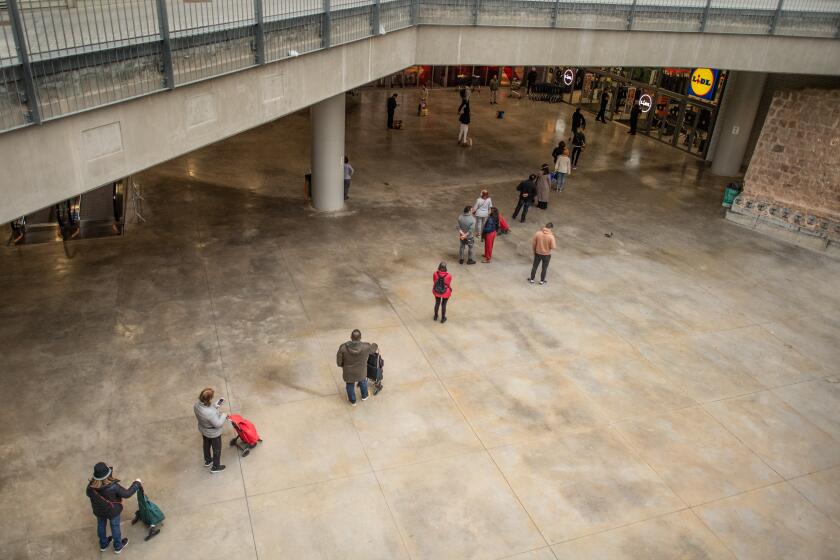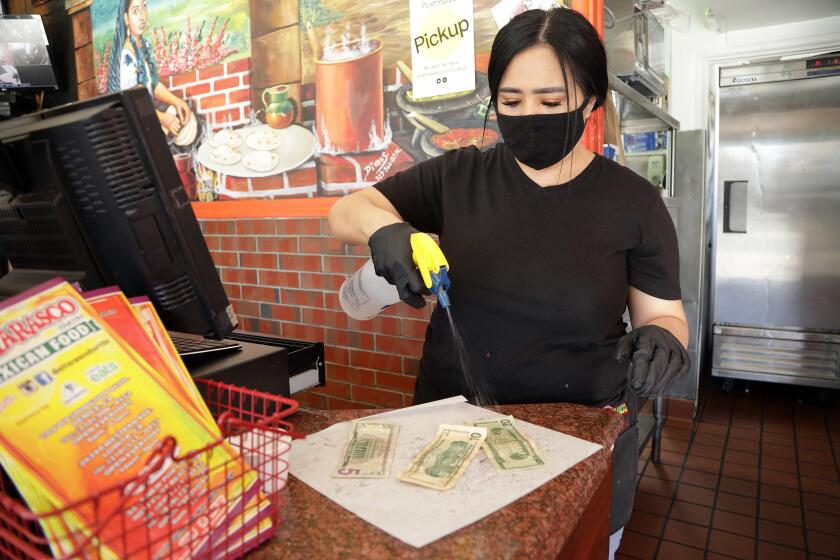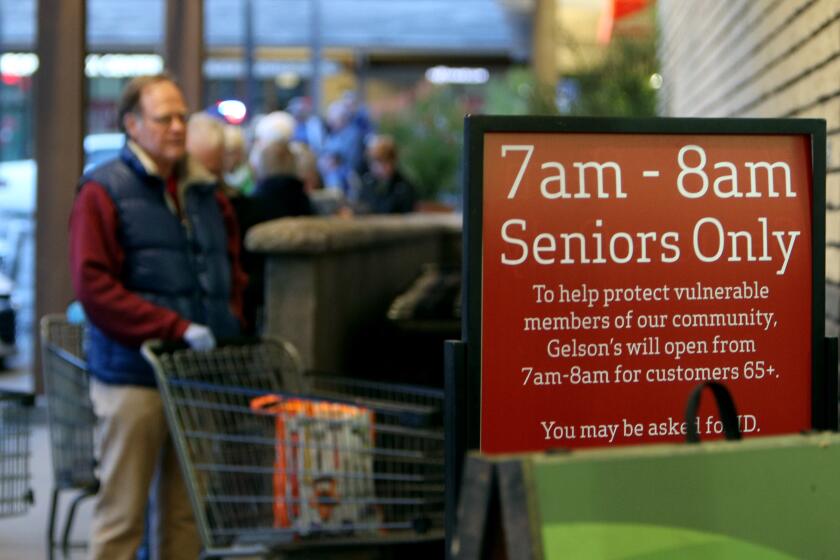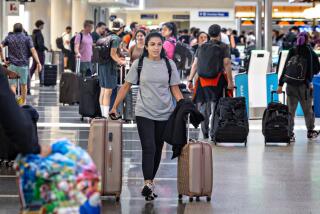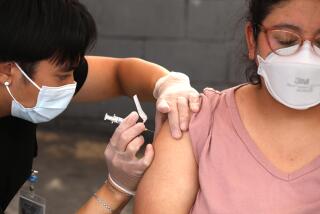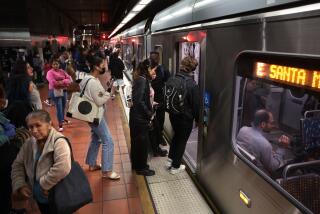Seniors face risks from coronavirus, but also from loss of their basic rights
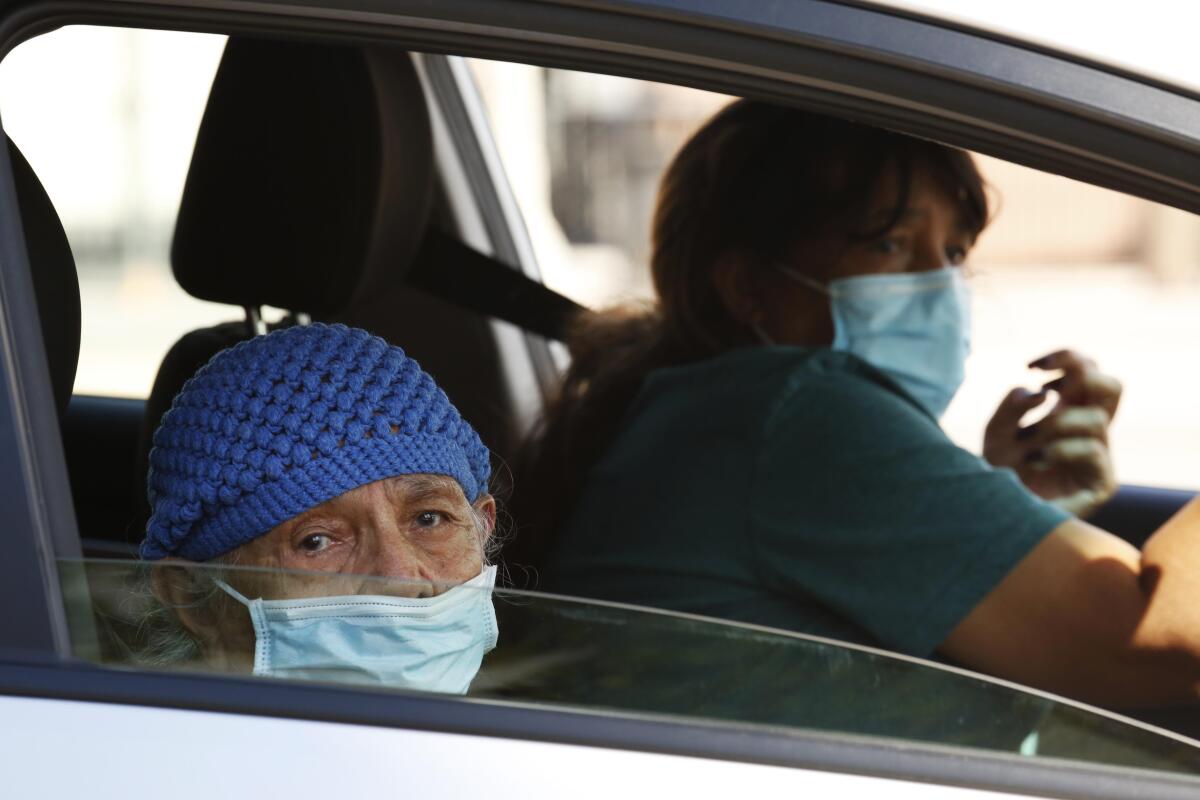
- Share via
The United States is home to roughly 49 million people who are 65 years or older, including 5.3 million in California. Many are at risk for severe illness with COVID-19, meaning that they must be extra vigilant to prevent being exposed to the coronavirus. Their families and caregivers must also be especially careful.
Seniors wrestle with numerous questions each day, including how to safely access essential services and cope with store hoarding, isolation and other challenges. Here are some answers to many of these questions.
What precautions should seniors take to prevent being infected?
Seniors should take the same precautions as everyone else. That means staying inside, avoiding contact with sick people, limiting contact with others and ensuring that people you live with do the same.
A guide to social distancing: When to stay home, when it’s OK to go out, and how to behave in public without putting yourself or others at risk.
People should wash their hands regularly, clean indoor surfaces and wear gloves if they are handling anything outside their residence.
What risk do seniors face from being stigmatized?
There are concerns worldwide that seniors will increasingly bear the brunt of hasty government decisions on the virus. As Bethany Brown, a research at Human Rights Watch, stated Monday: “Older people face risks to their rights...if governments do not take their specific experiences into account.”
One concern is government officials discounting the lives of elders in efforts to prop up the economy. Texas Lt. Gov. Dan Patrick recently fueled such fears, saying: “Those of us who are 70-plus, we’ll take care of ourselves. But don’t sacrifice the economy.”
What can people do to support seniors?
Regular communication with seniors — from a distance — is extremely important. Family and caregivers need to know what medications seniors are taking, and make sure they have an adequate supply of other essentials, such as food and cleaning supplies.
As for seniors, the AARP and other groups recommend seeking out a “buddy” — someone who will check on you, help you prepare and stock up on supplies, and help care for you if needed.
Numerous neighborhood groups and nonprofits are working to organize efforts for seniors, and deliver services and essential goods safely.
How can I help my older friends and family deal with loneliness?
Take time each day to call an older person you know, especially if he or she is living alone, as do 28% of seniors nationwide, according to a 2017 federal report. If they’re tech savvy, use Facetime, Skype, Zoom or another app to do a video call.
AARP: How to stay connected, entertained while you are home alone
As the writer Pearl Buck said during an earlier age, “Our society must make it right and possible for old people not to fear the young or be deserted by them.”
How can I care for an elderly person without putting them at risk?
Caregivers, friends and family must follow all the precautions listed above. Be aware that you could be a “silent spreader” unknowingly infecting other people.
Nancy McPherson, California state director of the AARP, recommends that neighbors help with the networking needed to support seniors.
“If you have an elderly neighbor who lives alone, offer to give your phone number to their children who live out of town, so they can have another contact on the same street as their parent,” said McPherson.
Los Angeles Times’ visual coverage of the coronavirus crisis
At times, caregivers may have to also need to exercise “tough love,” discouraging elders from unnecessary visits to markets and other crowded spaces. These can be difficult conversations, but until the contagion ebbs, they can’t be avoided.
Why are seniors at high risk from COVID-19?
Not all seniors are at high risk, but older Americans tend to have weakened immune systems, and most have at least one risk factor, such as diabetes, hypertension or a previous bout of pneumonia, according to Dr. Louise Aronson, a geriatrics professor at UC San Francisco School of Medicine.
Because of these risk factors, “old people are more likely to get very sick, need hospitalization, require breathing support and to die,” Aronson recently told Times columnist George Skelton.
We all know this instinctively, but it’s human nature during dangerous times not to acknowledge the truth and to question it, especially for elders in reasonably good health for our age.
Last week, the CDC released a report examining U.S. coronavirus cases through March 16. The report found that 80% of deaths associated with COVID-19 were among adults 65 and older, with the highest fatality rates involving persons 85 and older.
How can I tell if I might be infected with the coronavirus? How can I spot it in a loved one?
COVID-19 symptoms include fever, cough and trouble breathing. New research adds to the evidence that those infected can lose their sense of smell.
Apple and the CDC recently released an app to help identify symptoms.
If you think you are infected, call your doctor. Physicians can schedule telephone and “telehealth visits” to reduce the potential spread of the virus to other patients and health care workers.
AARP: This is a what a coronavirus infection feels like
What about shopping for essentials?
Numerous grocery stores have set “senior hours” to help the elderly assess stores without long lines.
To maintain coronavirus social distancing guidelines and to calm anxiety about going out to grocery stores, here are safety tips to make supermarket shopping faster.
In Los Angeles, the city approved an ordinance requiring stores to dedicate the first hour of business to seniors, the disabled and those who care for them.
What will the stimulus bill mean for seniors?
The $2-trillion economic stimulus package passed by Congress contains several important relief provisions for retirees.
People now receiving Social Security retirement and disability benefits will be getting the same one-time $1,200 stimulus payments that are being sent to most adults, subject to the same income limitations ($75,000 in adjusted gross income for single filers and $150,000 for joint filers).
Reuters offers more details here: How the $2 trillion U.S. coronavirus relief bill impacts retirement savers
More to Read
Sign up for Essential California
The most important California stories and recommendations in your inbox every morning.
You may occasionally receive promotional content from the Los Angeles Times.
